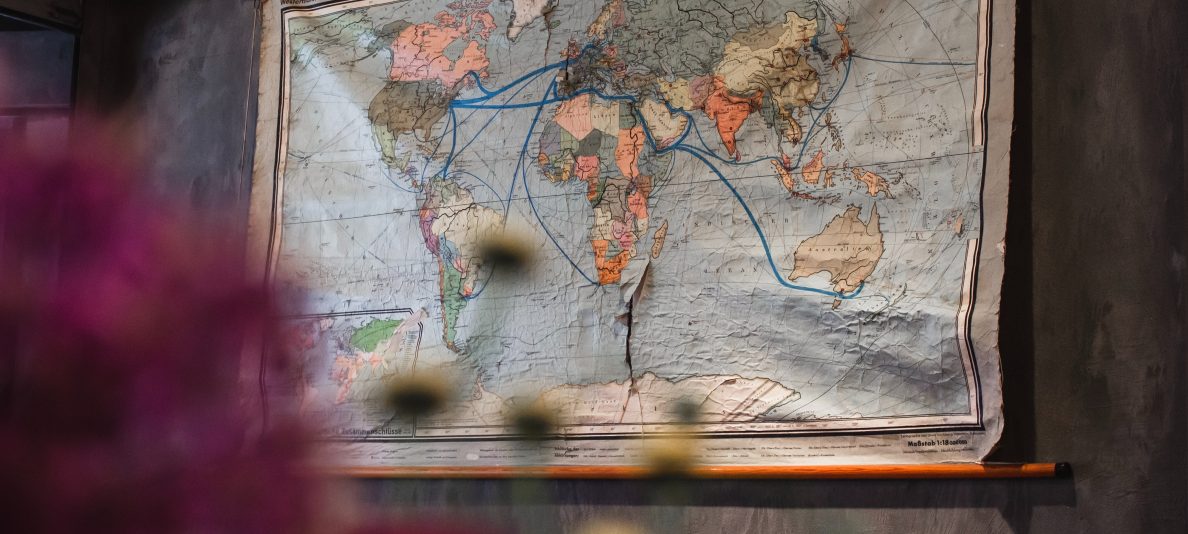In his TED Talk—on home, travel, and stillness—author Pico Iyer refers to the words of the French author Marcel Proust:
The real voyage of discovery consists not in seeing new sights, but in looking with new eyes.
When I Googled that phrase, I came up with several similar, though slightly different, versions. The most popular one comes up on over 800,000 sites, often used, as Iyer did, in the context of travel:
The real voyage of discovery consists not in seeking new landscapes, but in having new eyes.
 But I wasn’t done yet. I don’t trust “famous quote” sites, nor do I trust the democracy of the Internet. A little more searching led me to the actual quotation, and the original source. It’s Proust’s seven-volume work, Remembrance of Things Past (or In Search of Lost Time). The quotation above is a paraphrase of text in volume 5—The Prisoner—originally published in French, in 1923, and first translated into English by C. K. Moncrief.
But I wasn’t done yet. I don’t trust “famous quote” sites, nor do I trust the democracy of the Internet. A little more searching led me to the actual quotation, and the original source. It’s Proust’s seven-volume work, Remembrance of Things Past (or In Search of Lost Time). The quotation above is a paraphrase of text in volume 5—The Prisoner—originally published in French, in 1923, and first translated into English by C. K. Moncrief.
In chapter 2 of The Prisoner, the narrator is commenting at length on art, rather than travel. Listening for the first time to a work by the composer Vinteuil, he finds himself transported not to a physical location, but to a wonderful “strange land” of the composer’s own making. “Each artist,” he decides, “seems thus to be the native of an unknown country, which he himself has forgotten. . . .” These artists include composers, such as Vinteuil, and painters, such as the narrator’s friend, Elstir. He continues:
This lost country composers do not actually remember, but each of them remains all his life somehow attuned to it; he is wild with joy when he is singing the airs of his native land, betrays it at times in his thirst for fame, but then, in seeking fame, turns his back upon it, and it is only when he despises it that he finds it when he utters, whatever the subject with which he is dealing, that peculiar strain the monotony of which—for whatever its subject it remains identical in itself—proves the permanence of the elements that compose his soul. But is it not the fact then that from those elements, all the real residuum which we are obliged to keep to ourselves, which cannot be transmitted in talk, even by friend to friend, by master to disciple, by lover to mistress, that ineffable something which makes a difference in quality between what each of us has felt and what he is obliged to leave behind at the threshold of the phrases in which he can communicate with his fellows only by limiting himself to external points common to us all and of no interest, art, the art of a Vinteuil like that of an Elstir, makes the man himself apparent, rendering externally visible in the colours of the spectrum that intimate composition of those worlds which we call individual persons and which, without the aid of art, we should never know? A pair of wings, a different mode of breathing, which would enable us to traverse infinite space, would in no way help us, for, if we visited Mars or Venus keeping the same senses, they would clothe in the same aspect as the things of the earth everything that we should be capable of seeing. The only true voyage of discovery, the only fountain of Eternal Youth, would be not to visit strange lands but to possess other eyes, to behold the universe through the eyes of another, of a hundred others, to behold the hundred universes that each of them beholds, that each of them is; and this we can contrive with an Elstir, with a Vinteuil; with men like these we do really fly from star to star.
So there you have it. Maybe this adds to the meaning of the more-familiar “quotation.” Or maybe it lessens it, in your mind.
Maybe, for you, this is no longer a phrase about travel. Or maybe it is now much, much more so.
[photo: “New Eyes,” by Brian Talbot, used under a Creative Commons license—the photo’s caption at Flickr.com is the “most popular” version of Proust’s words, above]

Very nice! I love quotes, and it’s always neat to hear the true story behind the quote.
LikeLike
Thanks, Ashley. It’s fun to track down the “truth.”
LikeLike
Awesome, I love it!
LikeLike
Thanks. I appreciate the kind words.
LikeLike
nicely done, Craig. Like you, I believe context (of the source) is everything!
LikeLike
Thank, Brian. Context sometimes complicates things, but it’s worth it.
LikeLike
Thanks Craig!
Like you I often like to know the source of a quote. Often when a quote has multiple variations, it makes me believe that it’s a paraphrase of the original. What I found somewhat amusing, before reading your post, was that Wikipedia had the actual quote. Whereas the quote databases had it inaccurate.
LikeLike
Quotation sites are often just echo chambers of each other. I’m a fan of Wikipedia. Though a primary source, is good with footnotes, and those can send us to the sources. Thanks for the feedback, Johann.
LikeLike
Reblogged this on waffles and commented:
“The only true voyage of discovery, the only fountain of Eternal Youth, would be not to visit strange lands but to possess other eyes, to behold the universe through the eyes of another, of a hundred others, to behold the hundred universes that each of them beholds, that each of them is.”
LikeLike
Wonderful and perfect timing as I have just been investigating the short version myself.
LikeLike
Great! Glad you found what you’re looking for.
LikeLike
I’m reading Proust now and wondered when I would come across his famous quote. I was surprised, this week, to come across a passage similar but–as you point out–different in both context and meaning to the popular quote I’d heard so many times. I’m a big fan of efforts to debunk the sources of famous quotes roaming the internet, and I’m glad you tackled this one!
LikeLike
Glad I could be of help. Reading Proust . . . you’re tackling more than I did.
LikeLiked by 1 person
Please tell me which of the books this quotation comes from. I am reading the entire multi-volume Remembrance of Things Past; regrettably, I started with the last book which was the only one I could obtain when I started. Now, of course, I am hooked.
LikeLike
Volume 5 out of 7. Hope that helps.
LikeLike
FOUND IT: Page 559, The Captive, Volume Two of Remembrance of Things Past, Random House, 1927, translated by C. K. Scott Moncrieff. I am learning that translators and publishers make a difference when reading international authors…also reading Pushkin too.
LikeLike
Yup, different titles and different volumes. Thanks for letting us know.
LikeLike
Mr craig i have a question about this quote
LikeLike
Despite the “correct” quotation from Proust, so many have fallen in love with the paraphrase attributed to him. While incorrect, it is the sentiment of the paraphrase that has captured the imagination of so many, myself included, and should be allowed to stand as a viable piece of wisdom all on its own. We could begin to attribute it to “Author unknown”, but why? Look how many find their way to the wonderful musings of Proust who might not otherwise if their path were blocked by “Anonymous”.
LikeLike
I agree. Well said. It’s better to bring people to the source than for them to stall out with an attribution to Anonymous or Benjamin Franklin or Martin Luther King, Jr. or Winston Churchill or. . . . Thanks much for adding to the conversation.
LikeLike
Thank you so much for finding this! I don’t trust those famous quotes either XD
LikeLike
They’re a good place to start the search, but they need sources, sources, sources.
LikeLike
The beauty of art is that it is an expression of self. Just as there are no two people that are exactly alike, there are typically no two interpretations that are exactly alike. I appreciate Craig opening up this thread back in 2013 to help each of us think deeply about what the artist was expressing. My interpretation is that what is happening here (in this post) is what was being written about. Each of us can expand our point of view by seeing through new eyes. No right or wrong simply expanding our point of view through self-expression.
LikeLike
Thanks, Chip. Well said! Glad that you’ve joined the conversation with your perspective.
LikeLike
I think its far older. And orginaly from Marc Aurel (latin).
LikeLike
Thanks for the input!
LikeLike
It really depends on which translation you have – I have four different translations of the work, and still I haven’t learnt French!
LikeLike
I studied French in college, and about the only thing I can remember how to say is “Je parle français un peu.”
LikeLike
Thank you! I loved the quote, now I do even more. Out of interest, is ‘Universe’ the correct translation from french? I ask because ‘universes’ is a contradiction, and would like to know if it was deliberate or maybe a translation issue?
LikeLike
Hmmmm. . . . not being fluent in French, I can’t say for sure, but the translation seems accurate when comes to “universes”: Le seul véritable voyage, le seul bain de Jouvence, ce ne serait pas d’aller vers de nouveaux paysages, mais d’avoir d’autres yeux, de voir l’univers avec les yeux d’un autre, de cent autres, de voir les cent univers que chacun d’eux voit, que chacun d’eux est. Thanks for the comment!
LikeLike